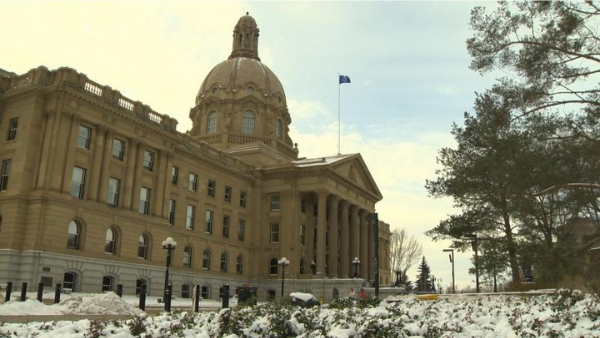Province Introduces Five Days of Paid Sick Leave
The BC Federation of Labour acknowledges the milestone, but says it falls short of the 10 days that workers had asked for.
Andrew MacLeod 25 Nov 2021 | TheTyee.ca
Andrew MacLeod is The Tyee’s Legislative Bureau Chief in Victoria and the author of All Together Healthy (Douglas & McIntyre, 2018). Find him on Twitter or reach him at amacleod@thetyee.ca.

About half of BC workers currently lack paid sick leave, and they are disproportionately the most vulnerable people in the province, said Labour Minister Harry Bains.
Photo by Jonathan Hayward, the Canadian Press.
B.C. Labour Minister Harry Bains says the government has struck the right balance by deciding employees in the province will be legally entitled to a minimum of five days per year of employer-paid sick leave.
The new entitlement is short of the 10 days that most workers participating in a government engagement process said they supported and that the BC Federation of Labour said should be the minimum.
“Five days is a sustainable solution given the challenges faced by many sectors,” Bains said. “I think it’s all about balance and listening to people.”
The new minimum applies to all workers covered by the Employment Standards Act and will be in force starting Jan. 1, 2022. It includes part-time employees, but not people who are self-employed or work in federally regulated sectors.
The federal government has pledged that workers in federally regulated jobs will be entitled to 10 days a year of paid sick leave but has not yet passed the necessary legislation to make it happen.
The Tyee is supported by readers like you Join us and grow independent media in Canada
Last May, the B.C. government created a temporary paid sick leave that covered up to three days as part of its response to the COVID-19 pandemic and the risk of people going to work sick and spreading the disease because they couldn’t afford to miss a day’s pay.
Under the measure, which expires Dec. 31, the government has been reimbursing employers up to $200 per day to help cover the wages for people off work because they were sick.
According to a budget update earlier this week, of the $325 million budgeted for the program, only $15 million had been spent as demand fell short of the worst-case scenario the government had projected.
In September, Bains announced the government would make paid sick leave permanent but hadn’t decided how many days it would cover or whether the government or employers would pay for it.
It launched an engagement process, during which 81 per cent of workers and 19 per cent of employers said they supported 10 days of employer-paid sick leave. More employers and fewer workers supported the other two options the government gave, five days or three.
Anita Huberman, the president and CEO of the Surrey Board of Trade, participated in the government’s announcement and said she believes five is the right number of days.
The BC Federation of Labour released a statement saying that while the announcement was a significant milestone, it fell short of the coverage sick workers need.
“We’re disappointed that it’s only half the 10-day standard that science supports and that is the overwhelming preference of British Columbians,” said president Laird Cronk.
Provincial health officer Dr. Bonnie Henry, speaking alongside Bains, said the need for paid sick leave was one of the many lessons learned from the COVID-19 pandemic.
“We are all in the same storm, but we are not all in the same boat,” she said. “We have seen that the pandemic has exposed and amplified inequities, and experiences have been quite different for different groups of people.”
In particular, women and marginalized, lower-income and racialized people have carried a heavier burden in the pandemic, and it’s become clear that economic policies have health impacts, she said.
Bains said about half of B.C. workers lack paid sick leave and they are disproportionately the most vulnerable people.
“These are the very people who can least afford to stay home and lose wages when sick,” he said. “I firmly believe no worker should have to choose to go to work sick or stay home and lose wages.”

BC Commits to Paid Sick Leave by Jan. 1, But Details Still to Come READ MORE
The BC Liberals released a statement saying they supported the introduction of paid sick leave but criticized the decision to “burden” employers by passing the cost on to them.
BC Green Party Leader and Cowichan Valley MLA Sonia Furstenau said paid sick leave is needed to keep people healthy and reduce transmission of infectious diseases, but the number of days should be based on desired public health and economic outcomes.
“Most OECD countries have 10 days or more of paid sick leave,” she said. “That’s because paid sick leave is an essential public health measure, and an important basic standard for business. Government should closely monitor the impacts of this policy over the next year, and work with labour advocates and business to explore moving to match other OECD countries.”
Furstenau also said the government should make sure small and medium-sized businesses are supported so that the financial burden isn’t dropped on already stretched business owners.
B.C. Labour Minister Harry Bains says the government has struck the right balance by deciding employees in the province will be legally entitled to a minimum of five days per year of employer-paid sick leave.
The new entitlement is short of the 10 days that most workers participating in a government engagement process said they supported and that the BC Federation of Labour said should be the minimum.
“Five days is a sustainable solution given the challenges faced by many sectors,” Bains said. “I think it’s all about balance and listening to people.”
The new minimum applies to all workers covered by the Employment Standards Act and will be in force starting Jan. 1, 2022. It includes part-time employees, but not people who are self-employed or work in federally regulated sectors.
The federal government has pledged that workers in federally regulated jobs will be entitled to 10 days a year of paid sick leave but has not yet passed the necessary legislation to make it happen.
The Tyee is supported by readers like you Join us and grow independent media in Canada
Last May, the B.C. government created a temporary paid sick leave that covered up to three days as part of its response to the COVID-19 pandemic and the risk of people going to work sick and spreading the disease because they couldn’t afford to miss a day’s pay.
Under the measure, which expires Dec. 31, the government has been reimbursing employers up to $200 per day to help cover the wages for people off work because they were sick.
According to a budget update earlier this week, of the $325 million budgeted for the program, only $15 million had been spent as demand fell short of the worst-case scenario the government had projected.
In September, Bains announced the government would make paid sick leave permanent but hadn’t decided how many days it would cover or whether the government or employers would pay for it.
It launched an engagement process, during which 81 per cent of workers and 19 per cent of employers said they supported 10 days of employer-paid sick leave. More employers and fewer workers supported the other two options the government gave, five days or three.
Anita Huberman, the president and CEO of the Surrey Board of Trade, participated in the government’s announcement and said she believes five is the right number of days.
The BC Federation of Labour released a statement saying that while the announcement was a significant milestone, it fell short of the coverage sick workers need.
“We’re disappointed that it’s only half the 10-day standard that science supports and that is the overwhelming preference of British Columbians,” said president Laird Cronk.
Provincial health officer Dr. Bonnie Henry, speaking alongside Bains, said the need for paid sick leave was one of the many lessons learned from the COVID-19 pandemic.
“We are all in the same storm, but we are not all in the same boat,” she said. “We have seen that the pandemic has exposed and amplified inequities, and experiences have been quite different for different groups of people.”
In particular, women and marginalized, lower-income and racialized people have carried a heavier burden in the pandemic, and it’s become clear that economic policies have health impacts, she said.
Bains said about half of B.C. workers lack paid sick leave and they are disproportionately the most vulnerable people.
“These are the very people who can least afford to stay home and lose wages when sick,” he said. “I firmly believe no worker should have to choose to go to work sick or stay home and lose wages.”

BC Commits to Paid Sick Leave by Jan. 1, But Details Still to Come READ MORE
The BC Liberals released a statement saying they supported the introduction of paid sick leave but criticized the decision to “burden” employers by passing the cost on to them.
BC Green Party Leader and Cowichan Valley MLA Sonia Furstenau said paid sick leave is needed to keep people healthy and reduce transmission of infectious diseases, but the number of days should be based on desired public health and economic outcomes.
“Most OECD countries have 10 days or more of paid sick leave,” she said. “That’s because paid sick leave is an essential public health measure, and an important basic standard for business. Government should closely monitor the impacts of this policy over the next year, and work with labour advocates and business to explore moving to match other OECD countries.”
Furstenau also said the government should make sure small and medium-sized businesses are supported so that the financial burden isn’t dropped on already stretched business owners.

Alberta worker advocacy group applauds Ottawa's 10-day sick leave bill, calls on province to follow suit
The Alberta Federation of Labour (AFL) applauded Friday's announcement but said the ball is now within the court of the province to extend paid sick leave provisions for all workers since the legislation would apply to 10 per cent of the overall Canadian labour force.
"Workers have waited far too long for this common-sense policy," said AFL president Gil McGowan, "10 days of paid sick leave is the minimum that policymakers should be pushing for — and the minimum that workers should accept." Read our press release. Read news story.
Action
Demand paid sick leave for all Alberta’s workers
Go to work sick or stay home without pay and even risk losing your job—Alberta’s workers shouldn’t have to choose between these options. But Jason Kenney is forcing them to choose and workers are saying enough is enough! Alberta’s workers need 10 permanent, paid sick days so they can afford to take time off from work when sick. Send an email to Jason Kenney to demand paid sick leave today!




No comments:
Post a Comment